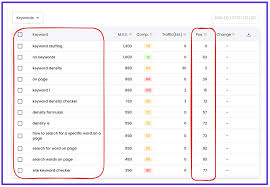The Power of Keywords: Finding the Right Ones for Your Website
In the vast landscape of the internet, keywords act as guiding stars that lead users to your website. Choosing the right keywords is crucial for optimizing your online presence and reaching your target audience effectively.
Fortunately, there are tools available that can help you in this endeavor. Websites dedicated to keyword research provide valuable insights into popular search terms, competition levels, and potential opportunities for your content.
How Keyword Research Tools Work
Keyword research tools analyze search patterns and behaviors to identify relevant keywords that can drive traffic to your website. By understanding what users are searching for, you can tailor your content to meet their needs and improve your search engine rankings.
Benefits of Using Keyword Research Tools
By leveraging keyword research tools, you can:
- Discover high-ranking keywords relevant to your niche
- Evaluate keyword competitiveness and search volume
- Identify long-tail keywords for targeted content creation
- Optimize your website for improved SEO performance
Choosing the Right Keywords for Your Website
When selecting keywords for your website, consider factors such as relevance, search volume, and competition. Focus on long-tail keywords that are specific to your business or industry to attract quality traffic and increase engagement.
Remember that keyword research is an ongoing process. Regularly monitor keyword performance and make adjustments based on changing trends and user behavior to stay ahead in the digital landscape.
Get Started with Keyword Research Today!
Unlock the potential of your website by harnessing the power of keywords. Explore keyword research tools available online and start optimizing your content for greater visibility and impact.
Top 6 FAQs About Using Keyword Research Tools to Enhance Your Website’s SEO Strategy
- 1. What are keywords and why are they important for my website?
- 2. How do keyword research tools help in identifying relevant keywords?
- 3. What factors should I consider when choosing keywords for my website?
- 4. Can keyword research tools provide insights into search volume and competition levels?
- 5. How can long-tail keywords benefit my content strategy?
- 6. Is keyword research a one-time process or should it be regularly updated?
1. What are keywords and why are they important for my website?
Keywords are specific words or phrases that users type into search engines to find relevant information online. They play a crucial role in determining the visibility of your website in search engine results. By incorporating relevant keywords into your website content, you can improve its search engine optimization (SEO) and attract targeted traffic. Keywords act as a bridge between your website and potential visitors, helping them discover your content and services. Understanding the significance of keywords and utilizing them effectively can significantly enhance your website’s online presence and reach.
2. How do keyword research tools help in identifying relevant keywords?
Keyword research tools play a crucial role in identifying relevant keywords by leveraging data and analytics to uncover search patterns and user behaviors. These tools analyze vast amounts of search data to provide insights into popular search terms, competition levels, and potential opportunities for content optimization. By understanding what users are searching for, businesses can tailor their keyword strategy to align with their target audience’s interests and needs. Ultimately, keyword research tools empower website owners to make informed decisions on selecting the most effective keywords that will drive traffic, improve search engine rankings, and enhance overall online visibility.
3. What factors should I consider when choosing keywords for my website?
When selecting keywords for your website, several crucial factors should be taken into account to ensure optimal results. Consider the relevance of the keywords to your content and target audience, as this will directly impact your website’s visibility and engagement. Evaluate the search volume and competition level of the keywords to gauge their potential effectiveness in driving traffic to your site. Additionally, focus on long-tail keywords that are specific to your niche to attract quality leads and improve SEO performance. By carefully considering these factors, you can strategically choose keywords that align with your business goals and enhance your online presence effectively.
4. Can keyword research tools provide insights into search volume and competition levels?
Keyword research tools play a crucial role in providing valuable insights into search volume and competition levels. By utilizing these tools, website owners can gain a comprehensive understanding of the popularity of specific keywords and the level of competition they face in the digital landscape. This data allows businesses to make informed decisions when selecting keywords for their content, ensuring that they target terms that are not only relevant but also have the potential to drive traffic and improve search engine rankings.
5. How can long-tail keywords benefit my content strategy?
Long-tail keywords play a crucial role in enhancing your content strategy by targeting specific and niche search queries. By incorporating long-tail keywords into your content, you can attract highly relevant traffic to your website, leading to better engagement and conversions. These longer, more detailed phrases not only help you rank higher in search engine results but also enable you to cater to the unique needs and preferences of your target audience. Embracing long-tail keywords in your content strategy can boost visibility, improve SEO performance, and ultimately drive meaningful interactions with your online visitors.
6. Is keyword research a one-time process or should it be regularly updated?
Keyword research is not a one-time task but an ongoing process that requires regular updates. The digital landscape is constantly evolving, with search trends, user behavior, and competition levels changing rapidly. To maintain a strong online presence and stay ahead of the curve, it is essential to continuously monitor keyword performance, identify new opportunities, and adjust your strategy accordingly. By regularly updating your keyword research efforts, you can ensure that your website remains optimized for search engines and effectively targets your desired audience.

